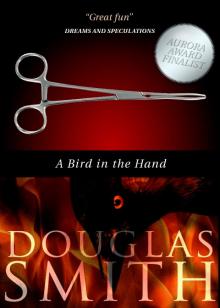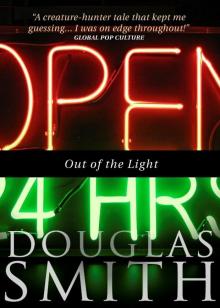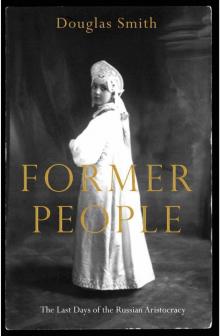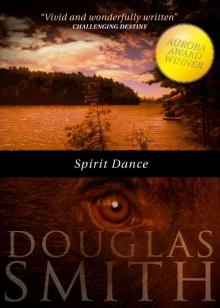- Home
- Douglas Smith
A Bird in the Hand Page 3
A Bird in the Hand Read online
Page 3
Only their things are a little…different.
A painter who talks to Vincent van Gogh
A shapeshifter hunting one of his own
The secret to being the luckiest man alive
Welcome to Impossibilia!
“The finest short-story writer Canada has ever produced in the science fiction and fantasy genres.”
—Robert J. Sawyer, Hugo and Nebula Award winning author
“One of Canada’s most original writers of speculative fiction.”
—Library Journal
“A great storyteller with a gifted and individual voice.”
—Charles de Lint, World Fantasy Award winning author
“In the grand manner that harks back to Bradbury and Sturgeon and Ellison.”
—Chaz Brenchley
“In my search for the perfect short story, the three in this volume certainly qualify.”
—SF Crowsnest Book Reviews
For more, please see the collection Impossibilia.
The Wolf At The End Of The World
© Douglas Smith
Introduction by World Fantasy Award winner, Charles de Lint
A shapeshifter hero battles ancient spirits, a covert government agency, and his own dark past in a race to solve a murder that could mean the end of the world.
Cree and Ojibwe legends mix with current day environmental conflict in this fast-paced urban fantasy that keeps you on the edge of your seat right up to its explosive conclusion. With an introduction by Charles de Lint.
~~~
The Heroka walk among us. Unseen, unknown. Shapeshifters. Human in appearance but with power over their animal totems.
Gwyn Blaidd is a Heroka of the wolf totem. Once he led his people in a deadly war against the Tainchel, the shadowy agency that hunts his kind. Now he lives alone in his wilderness home, wolves his only companions.
But when an Ojibwe girl is brutally killed in Gwyn’s old hometown, suspicion falls on his former lover. To save her, Gwyn must return, to battle not only the Tainchel, but even darker forces: ancient spirits fighting to enter our world…
And rule it.
~~~
“An immersive and enjoyable reading experience. Readers will delight in learning more about Native American mythology, which is skillfully woven throughout the story. Smith’s novel is both well paced and deftly plotted—leaving readers curious about what comes next for the Heroka in the modern world.”
—Publishers Weekly
“What makes The Wolf at the End of the World such an engrossing read are the characters and Doug’s wonderful prose, a perfect blend between matter-of-fact and lyricism. I can’t remember the last time I read a book that spoke to me, so eloquently, and so deeply, on so many levels. ... I’ll be rereading it in the future because it’s that sort of book. Richly layered and deeply resonant. An old friend, from the first time you read it.”
—Charles de Lint, World Fantasy Award winner
~~~
Author’s note: The Wolf at the End of the World takes place five years after the events in my award-winning novelette, “Spirit Dance” (available in my collection, Impossibilia, or as a stand-alone ebook). In the novel, Gwyn Blaidd, the hero of “Spirit Dance,” battles ancient native spirits, the shadowy Tainchel, and his own dark past in a race to solve a murder that might mean the end of the world. If you enjoyed “Spirit Dance,” here’s your chance to continue your journey with Gwyn, Ed, Leiddia, Mitch, and a host of new characters.
Chapter 1: Mary
Everything had gone wrong, and now Mary Two Rivers was running away. Away from the dam site, away from the damage they’d done, stumbling through the bush in the dark, trying to keep up with Jimmy White Creek and ahead of the security guards. And the dogs. She could hear dogs barking now.
What had she been thinking? Why had she gone along with Jimmy and the rest of them? She was an A student. She was going to university in the fall. She had plans, plans to get off the Rez. Plans that didn’t include jail.
Hanging a banner over the dam to protest the loss of Ojibwe land was one thing, but then somebody had poured gasoline on one of the construction vehicles and lit it on fire. And she’d let herself be part of it.
Just because Jimmy had a cute smile and cuter butt—a butt that was getting farther and farther ahead of her as she struggled to keep up. She was a bookworm, not an athlete, and the ground was starting to rise. Jimmy was heading for the west ridge overlooking the still dormant dam and its reservoir lake. She didn’t know where the other kids were. Everyone had scattered when the guards appeared, and she’d followed Jimmy. Or tried to.
“Jimmy!” she cried in a desperate whisper. “Wait up!” She didn’t know these woods anymore. If she lost him, she doubted she’d get far before the guards caught her.
Jimmy stopped on the hill ahead of her, chest heaving, breath hanging misty in the chill October air. The moonlight caught his pale, sweating face, and in that moment, she wondered how she’d ever thought he was handsome. “Mary, you gotta keep up,” he panted, his voice breaking. “There’s a path through the trees on top of the ridge. We’ll lose them in there and cut back to the Rez.” He started up the slope again, not waiting for her.
Forcing her trembling legs to move, she kept climbing. Jimmy disappeared over the top. Half a minute later, she scrambled up the last few yards. She looked around. Jimmy was nowhere in sight.
The tall jack pines stood closer here, the undergrowth thick between them, their high tops touching, blocking off the cold light from the waxing half moon. Whatever path Jimmy had taken was invisible, hidden by darkness.
She was alone and lost.
She sank to the ground, shaking. She was going to be caught. She was going to jail. What would her parents say? Their dream was for her to get a degree, to beat the odds of being born on the Rez. Their dream….
She swore softly to herself. Her dream, too. She stood up, anger conquering her fear. They would not catch her. Sucking in a deep breath, she let it out slowly to calm herself as she looked back down the hill she’d just climbed.
The dam and its dark captured lake lay in the distance below. Five burly figures were climbing the bottom of the hill. But worse, ahead of the guards, two gray shadows leapt over the rocks and brush of the slope. The dogs would reach her in less than a minute.
Turning back to the forest, she listened for any sound of Jimmy running ahead. There. Had that been a branch snapping deep in the woods? She moved in the direction of the noise, tripping over unseen rocks and roots. One patch of darkness loomed blacker than the rest. She stepped closer. It seemed to be an opening through the trees. Praying for this to be the path that Jimmy had taken, she plunged ahead.
As she moved into the forest, her eyes slowly adjusted to the deeper darkness under the trees, aided by the occasional sliver of moonlight slicing through the canopy of branches above. This was definitely a path. She paused a moment, straining to hear any sound of pursuit. The dogs were still barking, but they didn’t sound any closer.
The barking stopped. In the sudden silence, she heard the yip of a fox. She shuddered, remembering a saying of her misoomish, her grandfather. “Bad luck,” he’d told her as a child. “You hear a fox bark in the night, that’s bad luck.” But then the dogs took up their call again, and she allowed herself a small thrill of hope. The barking was fainter now. The dogs, and presumably the men with them, were moving away from her. They hadn’t found this path.
She was going to get away. The tension gripping her vanished, and her shaking legs gave way. She collapsed onto the soft cushion of pine needles that covered the ground, sweat soaking her t-shirt under her parka. She hugged her knees to her chest, shivering from the chill and the adrenaline still in her.
Now that the immediate danger was gone, another thought came to her. Just last week, a worker had died at the dam site. Animal attack, the cops had said. She swallowed. Because his body had been partially eaten.
Suddenly, huddled on the fo
rest floor in the dark, she didn’t feel quite as safe as she had a moment before. She wanted nothing more than to be home in her own bed, to hear her parents in the next room, talking or arguing, she didn’t care which, just so long as she was out of this nightmare. With that image filling her heart, she stood and started along the path once more, still praying to catch Jimmy, to have him lead her out of these woods, to lead her home.
A brightness grew ahead. A few seconds later, she stepped into a clearing lit in cold luminescence by the half moon above and enclosed by high rock walls ahead and to her left. To her right, the clearing gave way to the pines again, the level ground sloping away sharply. She walked to the top of the slope, looking for a way down. Her heart fell.
Halfway down, the pines thinned and then disappeared completely where the forest had been cleared near the bottom. The slope ended at the road leading onto the top of the dam. Beyond the dam, the black surface of the lake rippled like some great beast shuddering itself awake in the night.
She’d run the wrong way, back toward the dam.
With a sudden sick feeling, she realized what she should have figured out earlier. The dogs would have followed a scent. They hadn’t followed her, so they must have been on Jimmy’s trail, which meant Jimmy had taken another path, not the one that had led her here.
She’d taken the wrong path.
She looked around the clearing, searching for some alternative to retracing her steps. The slope below led right back to the dam and the scene of the crime, so that route was out. The dark lake caught her attention again, recalling childhood memories of her grandfather’s stories, the ones about the evil spirits that lived in deep water.
She turned her back on the lake and those memories. Enough. Time to go home. She considered the rock walls rising above her. The one facing the entrance to the path was almost sheer and rose too high for her even to think of trying to scale it. The wall facing the lake was less steep and offered some handholds for climbing.
It looked about twenty feet high. She examined its face for the best route, finally selecting a path that would bring her up beside a large boulder perched by itself at the top of the wall.
Or maybe it was a bush, since she saw something move on it, like branches shifting in the wind. Just then, a cloud scuttled across the night sky, swallowing the moon. As the clearing fell dark, she shivered at a sudden strange thought—that the shape had resembled something crouched there, and what she’d seen moving were actually long locks of hair.
Another gust brought a smell down to her, thick and heavy—the smell of mushrooms and rotting wood and wet moss. Bitter, and yet, at the same time, so sickly sweet she thought she would retch.
The cloud hiding the moon moved on. Pale moonlight shone down again, cold and cruel, and Mary finally saw what crouched above her, waiting.
…
[end of excerpt]
~~~
For more information on The Wolf at the End of the World, including full buying links for all major retailers, go to http://www.smithwriter.com/the_wolf_at_the_end_of_the_world.
Playing the Short Game: How to Market & Sell Short Fiction
“We short story writers have needed a book like this for decades. … It’s spectacular.”
—Kristine Kathryn Rusch, Award-winning author and editor
Take your first step to becoming a professional short fiction writer—Buy this book!
In an engaging and conversational style, award-winning author Douglas Smith teaches you how to market and sell short stories—and much, much more.
Even experienced writers will find value here as Smith takes you from your first sale to using your stories to build a writing career.
Contents
The Fundamentals: The different types of writers. The benefits of short fiction. Rights and licensing.
Selling Your Stories: Knowing when it’s ready. Choosing markets. Submitting stories. Avoiding mistakes. How editors select stories. Dealing with rejections. When to give up on a story.
After a Sale: Contracts. Working with editors. What your first sale means. Dealing with reviews.
A Writer’s Magic Bakery: Selling reprints. Foreign markets. Audio markets. Selling a collection. The indie option.
Becoming Established: Leveraging your stories. Discoverability and promotion. Career progression in short fiction.
With an introduction by multi-award winning writer and editor, Kristine Kathryn Rusch.
~~~
Find out more information on the book, including full buying links, at http://www.smithwriter.com/playing_the_short_game.

 A Bird in the Hand
A Bird in the Hand Out of the Light
Out of the Light Former People: The Final Days of the Russian Aristocracy
Former People: The Final Days of the Russian Aristocracy Spirit Dance
Spirit Dance